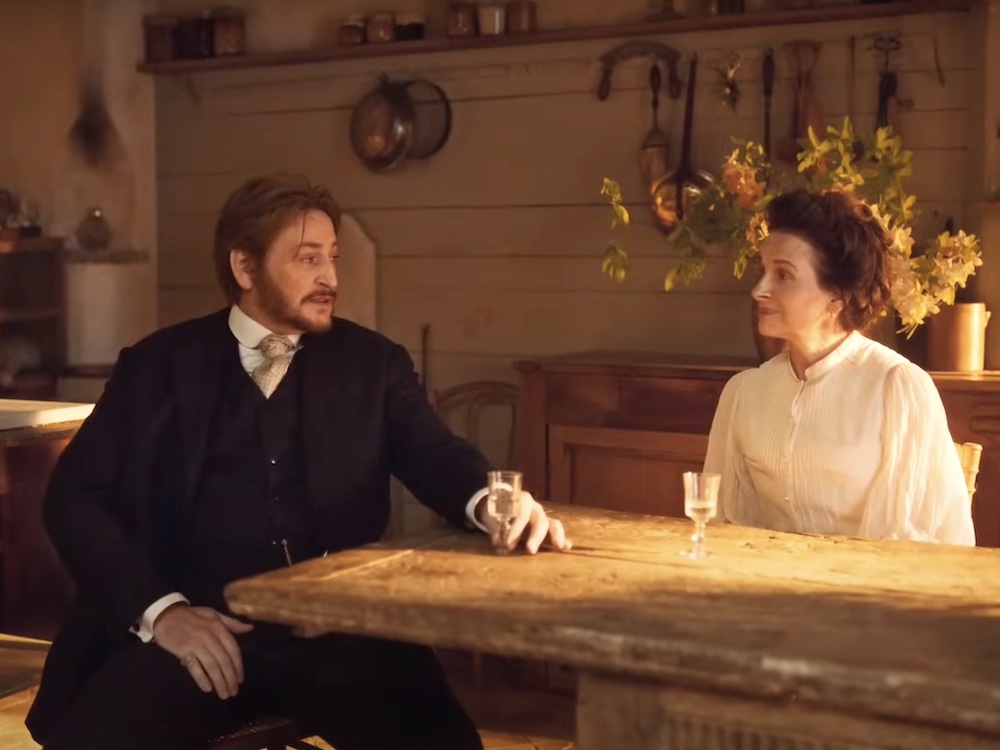It’s a rare work of art that will bring you to your knees these days. Not with horror, violence or some other shadow content conjured out of the inkiest darkness of human nature. The exact opposite: light, joy, beauty, care.
The Taste of Things is about food: its preparation, its beauty, its ability to bring people together in camaraderie, abundance and, yes, love. Big, grand, glorious, ridiculous love.
The premise is simple. Two people work together in a château kitchen. The setting is southern France. The year is 1889. Eugénie (a luminous Juliette Binoche) works with Dodin (Benoît Magimel). Over the course of their long-term partnership, he dreams up recipes, and she makes them happen. Curiously enough, the actors were, once upon a time, a real couple and share a daughter. This overlay of fiction and reality gives the story an added frisson of flavour, but really it is only one more ingredient in this feast of a film.
The opening sequence is an immersive experience in the delicate art of preparation. While Dodin and his coterie of older gentlemen friends enjoy the many courses of an epic dinner, Eugénie and her young helpers are hard at work in the kitchen. They’re cleaning, prepping and plating, deeply engaged in high-wire acts of culinary creation.
Before you take umbrage at the notion of women cooking for men, it is Eugénie who is very much the genius and, arguably, the architect of the entire experience. She is utterly, completely in control, choosing how and when she participates. When one of the men presses her to join them at the table, she explains, “I converse with you in the dining room through what you eat.”
Falling in the tradition of films like Big Night and Babette’s Feast, director Trần Anh Hùng brings a lilting gentleness to the proceedings. Things take as long as they take; this includes relationships as much as it does food — pot-au-feu, vol-au-vent, turbot and desserts like baked Alaska, charmingly known by its French name as omelette norvégienne (Norwegian omelette).
Although Eugénie and Dodin occasionally share a bed when she is so inclined, the woman has no interest in marriage. The two are equals in the kitchen, so why mess with matters by bringing in the contraption of matrimony? But Dodin is insistent and when Eugénie falls ill, he suggests that he cook for her.
If you haven’t swooned yet, prepare a nice soft spot for landing: here is where things get extremely woozy-making. As each successive course is introduced, Eugénie, along with the audience, falls deeper and deeper into a reverie, not unlike a trance. A food-love coma, if you will.
In addition to the food itself, the film is also very much a celebration of French culture. The film was the French entry to the Academy Awards this year. In an interview with the Guardian, the director detailed not only the production but also what it is to depict the lofty heights of culinary greatness.
Legendary chefs like Antonin Carême and Auguste Escoffier are obvious influences, as are some of the more esoteric French dishes. None more so than ortolan, small birds that are fattened in the dark over a course of months, then eaten in their entirety: heads, beaks, small body. The men (and they’re all men, again) partake with towels draped over their heads, the sounds of their delectations somehow both enticing and a little horrifying.
The traditional way of eating these birds, covered by a towel, serves a couple of different functions. In addition to keeping the aroma enclosed to heighten the experience, it also hides the faces of the people imbibing.
This rituel gastronomique was famously captured by chef Anthony Bourdain in his book Medium Raw:
I bring my molars down and through my bird’s rib cage with a wet crunch and am rewarded with a scalding hot rush of burning fat and guts down my throat. Rarely have pain and delight combined so well. I’m giddily uncomfortable, breathing in short, controlled gasps as I continue slowly — ever so slowly — to chew. With every bite, as the thin bones and layers of fat, meat, skin, and organs compact in on themselves, there are sublime dribbles of varied and wondrous ancient flavors: figs, Armagnac, dark flesh slightly infused with the salty taste of my own blood as my mouth is pricked by the sharp bones. As I swallow, I draw in the head and beak, which, until now, have been hanging from my lips, and blithely crush the skull.
In terms of plot, there is scant action, just an easy procession of kitchen scenes, outdoor picnics and after-dinner drinks. As Dodin and Eugénie gently traverse the power dynamic of their professional and personal relationship, the question of whether they will find a way to marry these things in a fruitful, equitable union is interesting but also almost beside the point.
The central idea is the work of creation and perfection. That is where the true beauty emerges. Not only in the glistening sheen of a well-cooked roast or the fringed delicacy of garden-fresh vegetables, but in the implementation of skill, the importance of patience — and ultimately the role of time in all things.
The Taste of Things is a celebration of pleasure in its many forms, but as with any giddy ride into the glories of physical existence, there is a downside. The higher you go, the greater the fall. As with food, so is it too with love. I won’t spoil the ending, but oh my lord, my heart.
In the end, only poetry remains. When asked to list the ingredients that make up a sauce, Pauline (Bonnie Chagneau-Ravoire), the couple’s young mentee, takes a tiny sip and begins to recite: “Short ribs, smoked bacon, red bell peppers, mushrooms, fennel, tomatoes, oranges, wine, parsley, thyme, bay leaf, cumin, juniper berry, clove.”
The list goes on. It’s a small moment inside this greater, most sumptuous of tapestries. But it sinks into your skin, a glistening bit of grandeur and simplicity, so artfully combined it’s impossible to say where one leaves off and the other begins.
‘The Taste of Things’ arrives in major theatres on Feb. 16. ![]()

















Tyee Commenting Guidelines
Comments that violate guidelines risk being deleted, and violations may result in a temporary or permanent user ban. Maintain the spirit of good conversation to stay in the discussion and be patient with moderators. Comments are reviewed regularly but not in real time.
Do:
Do not: